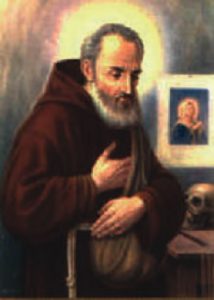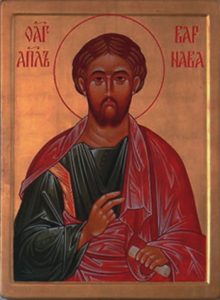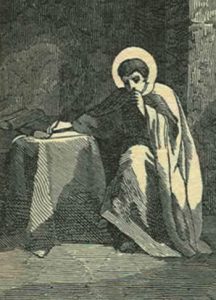June Saints
St Felix was born in Nicosia, Sicily, in 1715, the son of a shoemaker who died a month before he was born, leaving his widow with three children. The family was poor, but very religious. As a young boy, Felix did not go to school, but worked for a shoemaker close to the Capuchin friary, so he was able to observe the friars and their way of life. The more he saw of them, the more he wanted to join them.
At the age of 20, Felix asked to be admitted to the Order as a lay brother – being illiterate, he could not be a priest. He was turned down. Each year for eight successive years, the friars rejected him. Amazingly, he never tried to join another Order. For him, being a man of God and being a Capuchin were one and the same. Finally, in 1743, he was accepted and began his novitiate, making his profession the following year. He was distinguished among the novices by his flair for obedience, his angelic purity, his love of mortification and his truly seraphic patience.
Contrary to custom, the new friar was sent to his home town where he was given the job of collecting alms. Every day he would walk through the streets, knocking on the doors of the rich, inviting them to share their prosperity, then visiting the poor with gifts. He would always say “Thank you” for anything received. When he was refused, he would say: “Let it be for the love of God.”
Although unable to read or write, Felix was immersed in Christian doctrine. He listened closely to Scripture and other books read in the refectory, absorbing their contents as he spent time in front of the Tabernacle. He was devoted to the crucified Christ, fasting and doing penance, particularly during Lent. He loved Our Lady.
When he was relieved of duties because of his ill health, he was always ready to serve others, especially the sick Brothers in the infirmary. The weaker he became, the more he concentrated on God. At the end of May 1787, he was overtaken by a sudden, raging fever while working in the garden. Put under obedience to lie down, he told the doctor to save his medicines as they were useless. “This is my last illness,” he said. And he was right; he died shortly afterwards.
Saint Felix, teach us to face our own death in peace.
(Source: Internet – various)
Barnabas, born Joseph, was an early Christian, one of the earliest Christian disciples in Jerusalem. According to Acts 4:36 Barnabas was a Cypriot Jew. Named an apostle in Acts 14:14, he and Paul the Apostle undertook missionary journeys together and defended Gentile converts against the Judaisers. They travelled together making more converts (c 45-47), and participated in the Council of Jerusalem (c 50). Barnabas and Paul successfully evangelised among the "God-fearing" Gentiles who attended synagogues in various Hellenised cities of Anatolia.
Barnabas' story appears in the Acts of the Apostles, and Paul mentions him in some of his epistles. Tertullian named him as the author of the Epistle to the Hebrews, but this is conjecture. Although the date, place, and circumstances of his death are historically unverifiable, Christian tradition holds that Barnabas was martyred at Salamis, Cyprus, in 61 AD.
Saint Barnabas, help us to be true apostles of Jesus.
(Source: http://en.wikipedia.org/wiki/Barnabas)
Saint Prosper was born at Aquitaine, in the year 403. His works show that in his youth he had happily applied himself to all the branches both of polite and sacred learning. On account of the purity and sanctity of his manners, he is called by those of his age a holy and venerable man. Prosper does not appear to have been any more than a layman; but being of great virtue, and of extraordinary talents and learning, he wrote several works in which he ably refuted the errors of heresy.
St. Leo the Great, being chosen Pope in 440, invited him to Rome, made him his secretary, and employed him in the most important affairs of the Church. Prosper crushed the Pelagian heresy, which began again to raise its head in that capital, and its final overthrow is said to be due to his zeal, learning, and unwearied endeavours. The date of his death is uncertain, but he was still living in 463.
Saint Prosper, obtain for us the strength always to defend our faith.
(Source: http://www.sacred-texts.com/chr/lots/lots202.htm)
Tagged as: Saint Barnabas, Saint Felix of Nicosia, Saint Prosper of Aquitaine
Comments are closed.



 Entries(RSS)
Entries(RSS)